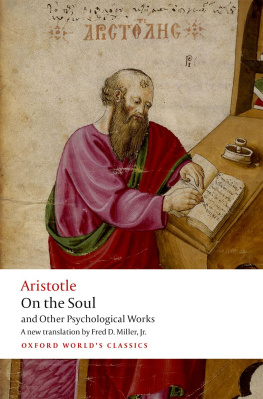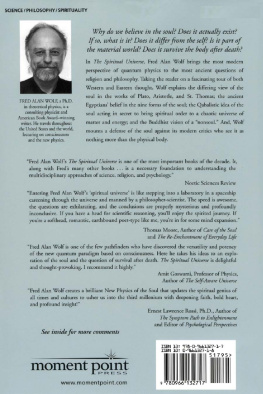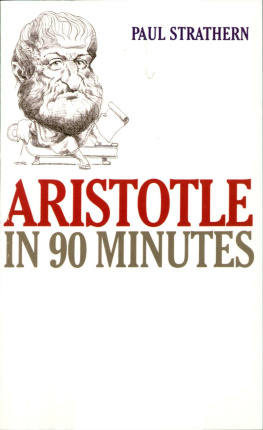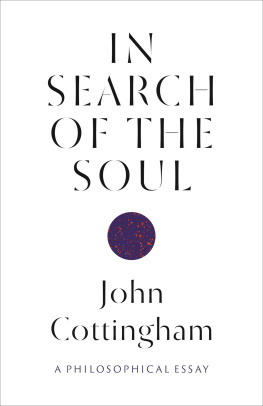Aristotle (384322 bce ) is one of the two greatest philosophers of antiquitythe other being Platoand in the view of many the greatest philosopher of all time. He began as a pupil of Plato in Athens, where he lived and taught for most of his career. He wrote extensively on a wide variety of subjects, including logic, metaphysics, ethics, and politics. But over one-third of all his writings fall under the general heading the Natural Sciences, and treat of such subjects as fundamental physics, astronomy, chemistry, meteorology, biology, and psychology. His general theory of psychology is set forth in On the Soul, followed by several specialized short treatises, known collectively as the Parva Naturalia, which deal with sense-perception, memory and recollection, sleep and dreams, longevity, and the physiological bases for life-processes. He also wrote popular dialogues on the soul that touch on religious themes, which, though subsequently lost, were praised by Cicero as a golden stream of eloquence. Aristotles psychological works have had a continuing influence up to the present.
Fred D. Miller, Jr. is Research Professor of Political Economy and Moral Science at the University of Arizona, and Professor Emeritus of Philosophy at Bowling Green State University. He is the author of Nature, Justice, and Rights in Aristotles Politics (1995) and has coedited collections including A Companion to Aristotles Politics (1991), Freedom, Reason, and the Polis (2007), A History of Philosophy of Law from the Ancient Greeks to the Scholastics (2007), and Reason and Analysis in Ancient Greek Philosophy (2013). He is an executive editor of the journal Social Philosophy and Policy.
OXFORD WORLDS CLASSICS
For over 100 years Oxford Worlds Classics have brought readers closer to the worlds great literature. Now with over 700 titlesfrom the 4,000-year-old myths of Mesopotamia to the twentieth centurys greatest novelsthe series makes available lesser-known as well as celebrated writing.
The pocket-sized hardbacks of the early years contained introductions by Virginia Woolf, T. S. Eliot, Graham Greene, and other literary figures which enriched the experience of reading. Today the series is recognized for its fine scholarship and reliability in texts that span world literature, drama and poetry, religion, philosophy and politics. Each edition includes perceptive commentary and essential background information to meet the changing needs of readers.

Great Clarendon Street, Oxford, ox2 6dp , United Kingdom
Oxford University Press is a department of the University of Oxford. It furthers the Universitys objective of excellence in research, scholarship, and education by publishing worldwide. Oxford is a registered trade mark of Oxford University Press in the UK and in certain other countries
Fred D. Miller, Jr. 2018
The moral rights of the author have been asserted
First published as an Oxford Worlds Classics paperback 2018
Impression: 1
All rights reserved. No part of this publication may be reproduced, stored in a retrieval system, or transmitted, in any form or by any means, without the prior permission in writing of Oxford University Press, or as expressly permitted by law, by licence or under terms agreed with the appropriate reprographics rights organization. Enquiries concerning reproduction outside the scope of the above should be sent to the Rights Department, Oxford University Press, at the address above
You must not circulate this work in any other form and you must impose this same condition on any acquirer
Published in the United States of America by Oxford University Press 198 Madison Avenue, New York, NY 10016, United States of America
British Library Cataloguing in Publication Data
Data available
Library of Congress Control Number: 2017955558
ISBN 9780199588213
ebook ISBN 9780191026430
Printed in Great Britain by Clays Ltd, St Ives plc
Contents
Aristotles treatise On the Soul (De Anima) is justly counted among the great works of philosophy. Its basic thesis, that the soul is the form of an organic body, sets it in sharp contrast with both Pre-Socratic physicalism and Platonic dualism. Aristotle argues that the soul comprises psychic powers including nutrition, sense-perception, and desire. He thereby demonstrates how human beings along with other living organisms may be understood within the wider framework of natural science. In addition, human beings, the most highly developed organisms, possess the capacity of thought, which enables them to guide their own actions rationally and to unlock the secrets of reality, so that they are uniquely akin to the divine. On the Soul also occupies a crucial place in Aristotles philosophical system, serving as a nexus for natural science, metaphysics, ethics, and politics. Historically, also, it was among the most important of his works, which fuelled an intellectual revolution in Western Europe after their rediscovery in the late Middle Ages.
In spite of its importance, however, if read in isolation On the Soul presents serious difficulties for the general reader and even for the specialist. Important topics such as perception are discussed incompletely, and others such as memory are mentioned only in passing. Aside from a few vague references, there is no explanation of how the functions of the soul are supported by the organs of the body. Fortunately, Aristotles other psychological works, collected in the Parva Naturalia, provide a valuable supplement, with in-depth discussions of perception, memory, sleep and dreaming, longevity, the life-cycle, and psycho-physiology. Moreover, there is also testimony by ancient authors concerning Aristotles lost works that pertain to the soul, for example regarding the afterlife. It is the aim of this volume to present all this material together in a new, clear, and consistent translation, with notes explaining particular passages and showing how they relate to Aristotles overall philosophical system.
I gratefully acknowledge support for my research by Lady Margaret Hall, Oxford, through the Beaufort Fellowship, the Department of Political Economy and Moral Science at the University of Arizona, and the Social Philosophy and Policy Foundation. The Jerome Library of Bowling Green State University and the unparalleled Ohio Link system have been an invaluable source of research materials. In preparing this translation I owe an inestimable debt to the legion of scholars, copyists, and editors who have preserved and studied Aristotles writings over more than two millennia. In particular I have benefited greatly from the translations and commentaries listed in the Select Bibliography. I first conceived of this project during a study of De Anima with the Ohio Greek Philosophy Group. Several individuals have generously commented on earlier drafts, including Julia Annas, Michael Baumer, Lawrence Jost, Rachana Kamtekar, Errol Katayama, Christine Keyt, Pamela Phillips, Ronald Polansky, Susan Prince, John Proios, Tristram Rogers, Kenneth Silverman, and Bjorn Westveldt. I owe special thanks to David Keyt and Christopher Shields, the one a former teacher and the other a former student, for their invaluable assistance.
Finally, I am deeply grateful to my wife Kathryn and my family for their constant encouragement and support.











